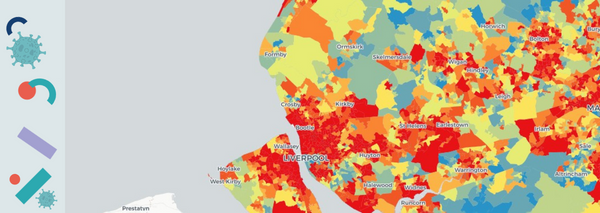How NIHR ARC’s rose to the challenge of COVID-19

A national publication highlighting how National Institute for Health and Care Research Applied Research Collaborations (NIHR ARCs) rose to the challenge of COVID-19 launches today, the third anniversary of the first UK lockdown.
Vital work from across the ARCs in response to the pandemic is showcased in NIHR ARCs: Supporting the fight against COVID-19 (PDF), including ARC NWC projects.
The publication brings together case studies demonstrating how ARCs pivoted their research programmes in response to the pandemic. It showcases work across a range of themes including children and young people, care homes, equality and diversity, end of life care and workforce planning.
NIHR ARC North West Coast (ARC NWC) have developed the Place-based Longitudinal Data Resource (PLDR). The PLDR is a web-based resource that brings together datasets which track changes in the determinants of health and health outcomes, in specific places over time.
The PLDR uses local and national datasets (e.g Hospital admissions data, budgetary data, prescribing data) to calculate indicators for places (neighbourhoods, local government areas, regions and countries) that are consistent over time. It also includes data from the North West Coast Household Panel Survey that has been commissioned by the NIHR Collaboration for Leadership in Health Research and Care, North West Coast (CLAHRC NWC). This survey was carried out in 2015 and 2018 in selected neighbourhoods in the North West.
The PLDR is designed to provide data that supports analysis of the health effects of area-based determinants and interventions. In particular, where new policies or interventions have been implemented a particular area a rapid natural experiment can be set up matching intervention areas to non-intervention areas selected from across England. For example, these approaches are being used to evaluate a community based cardiovascular service, a housing improvement intervention, a new GP quality improvement scheme and the CLAHRC NWC Neighbourhood Resilience Programme.
The publication was led by NIHR ARC East Midlands, with communications support from NIHR ARC West. In the foreword, the ARC Directors write:
“In 2020, we made rapid changes to our research programmes across the ARCs, to inform policy and practice, improve health and care, and deliver national-level impact in this rapidly changing landscape.
“Our expertise in data modelling, multiple long-term conditions, mental health and social care alongside our ability to build and sustain collaborations across the NHS, social care, the voluntary sector and industry, has placed us in a unique position. We have been able to contribute to the efforts to understand the virus and its impact on communities, locally, nationally and globally.
“This publication outlines our response as ARCs, both collectively and individually, to this challenge. It showcases the part we have played in supporting the health and care sector and patients, public and communities. We are proud of our part in lending our expertise to understanding the disease and assisting the global effort to contain it, improving outcomes and saving lives.”
Professor Lucy Chappell, Chief Executive of the NIHR and the Department of Health and Social Care’s Chief Scientific Advisor, said:
“The COVID-19 pandemic was unlike any health crisis we had experienced for a century. In order for us to tackle the pandemic swiftly and strongly, we needed a collaborative and sustained approach across health and care research that harnessed the power of our collective effort like never before.
“This impressive report sets out how that effort was provided, extending across many different themes, specialisms, and areas of the country. It illustrates how researchers, working together to tackle a common cause, can have such an important impact for patients and the public.”
Download NIHR ARCs: Supporting the fight against COVID-19 (PDF).
To keep up to date with the latest funding opportunities, events and projects, from across the country, join the ARC email newsletter and follow @NIHRARCs on Twitter.